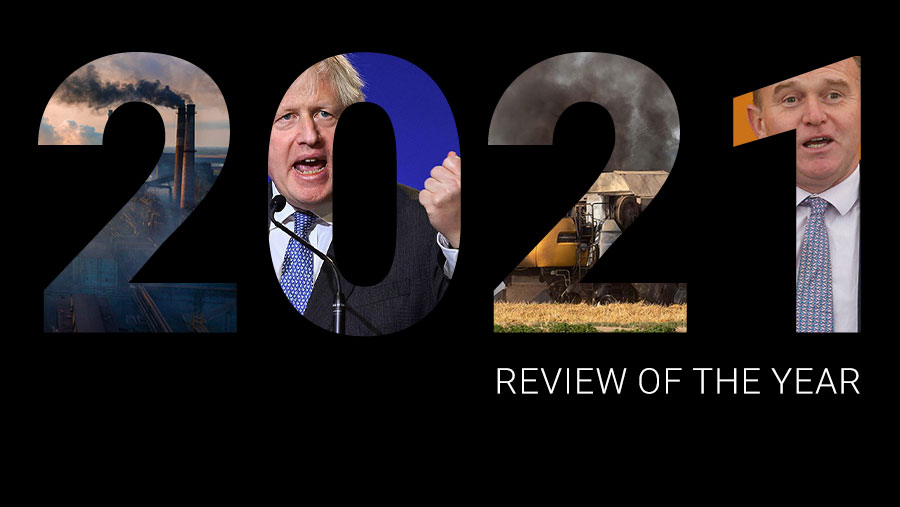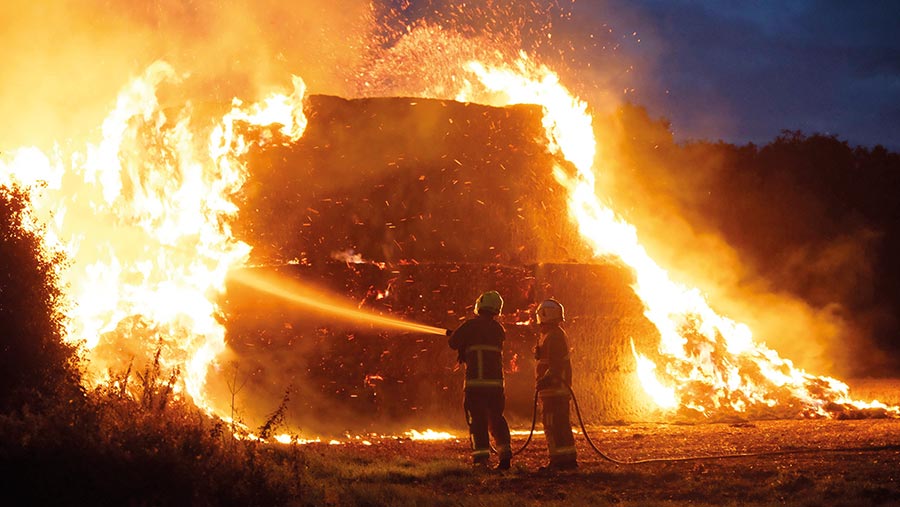2021: What made the farming news in November and December?

Our review of 2021 concludes with a look back at November and December.
NFU Mutual releases figures showing the increased cost of farm fires, avian influenza case emerge across the country and storms Arwen and Barra leave a trail of destruction in Scotland and northern England.
See also: Farmers send strong message to policymakers at COP26
November
With COP26 in full swing, the UK dairy sector set out a strategy to achieve net-zero climate targets by 2050.
The UK Dairy Roadmap, a newly formed cross-industry body, said it would develop structured advice to help all farm systems and dairy processing plants hit carbon, methane and nitrous oxide targets.
Avian influenza returned to the UK with vets identifying the disease at a small poultry premises near Wrexham in Wales.
Within days, cases began to emerge across the country as migratory birds flew in, bringing the virus with them.
A Scottish poultry producer was the first to describe her heartbreak at losing her flock – culled to help prevent further spread of the disease.
Farmers looked likely to miss out on grant money for tree planting as supplies of saplings slowed.
The shortfall was caused by a combination of Brexit, Covid-19 and unprecedented demand from landowners wanting to plant trees under environmental schemes.
Unfortunately, the pressure on supplies meant many were left without tree stocks and in danger of missing scheme deadlines.
Use of antibiotics on UK farms showed further dramatic year-on-year falls, according to a report by the Veterinary Medicines Directorate (VMD).
Figures showed sales of antibiotics for farm animals had declined for the sixth consecutive year, giving a total reduction of 79% since 2014.
The VMD also revealed the highest priority critically important antibiotics accounted for just 0.5% of the total 226t used on farms.

© Alamy Stock Photo
Figures released by NFU Mutual showed the cost of farm fires had shot up by 40% to total £69m in 2020. Vehicle fires accounted for an additional £20m in insurance claims.
Electrical faults were identified as a major cause, sparking a call from the rural insurer for farmers to have an electrician carry out regular checks on wiring.
Defra invited farmers and growers to take part in a consultation on the future of the AHDB.
Among the proposed changes was a five-yearly vote on how levy payer money should be spent in the cereals, pig, dairy and livestock sectors.
If met with approval, the first of these votes would take place in spring 2022.
December
Industry leaders were disappointed with the payments on offer for the three soil standards under Defra’s Sustainable Farming Incentive (SFI) for 2022, announced by Defra secretary George Eustice. But they stressed this must not discourage farmers in England from applying.
Ethicists warned the production of gene-edited livestock must be tightly regulated to protect animal welfare. The Nuffield Council on Bioethics said gene editing could help farmers make livestock more resistant to disease.
However, there was concern about unethical breeding and animal welfare dropping. Defra said it would consult the public and was taking a “step-by-step approach” to gene editing, starting with plants only.
Government support schemes failed to alleviate the crisis on British pig farms, sector leaders and processors warned.
National Pig Association chief executive Zoe Davies said the Private Storage Aid scheme, Slaughter Incentive Payment scheme and temporary visas for butchers were not making any difference to pig prices or throughput.
Labour leader Keir Starmer embarked on a major reshuffle of his shadow cabinet.
The well-liked West Country MP Luke Pollard – who has been leading a review of Labour’s rural policy to try and make the party more successful in farming circles – was replaced as shadow Defra secretary by Jim McMahon, MP for Oldham West and Royton.
Farmers were urged to review the security of their fertiliser storage amid soaring prices and potential excess stock on farms.
The rising value of existing stocks of nitrogen-based fertiliser could lead to increased thefts, the Agricultural Industries Confederation warned.

Close up drone shot of damage done by Storm Arwen © NFU
Storms Arwen and Barra left a trail of destruction across Scotland and northern England.
Many farms were recovering from the damage and power cuts caused by Arwen and its 98mph winds when Barra blasted into Britain from the Atlantic, with 80mph winds recorded on 7 December.
Trees were flattened and farm buildings damaged – with roofs blown off and collapsed walls. Farm leaders demanded an emergency government fund to help businesses recover.
Volunteers in Cornwall started work with farmers to tackle food waste by gathering surplus crops and delivering them to community kitchens and foodbanks. The initiative had already supplied more than 40 tonnes of fresh food to those in need.
